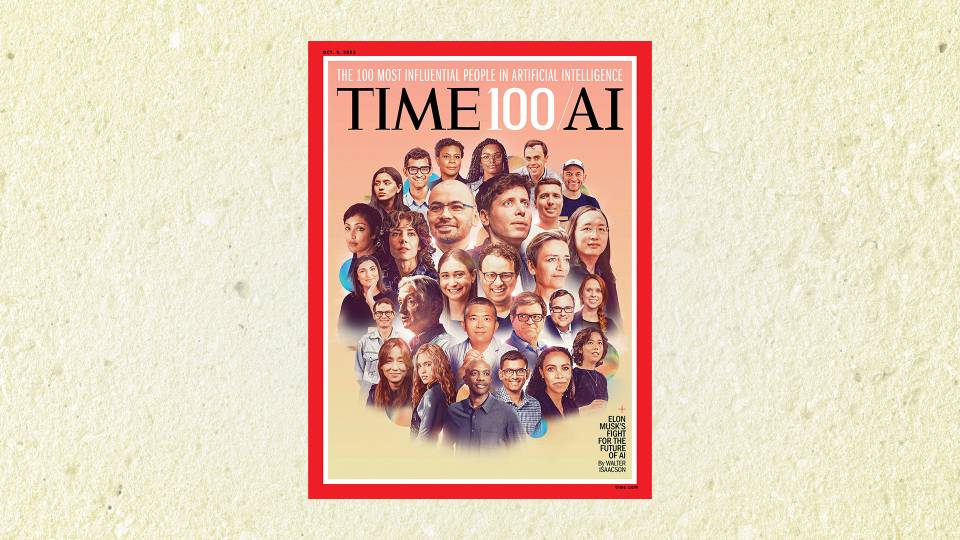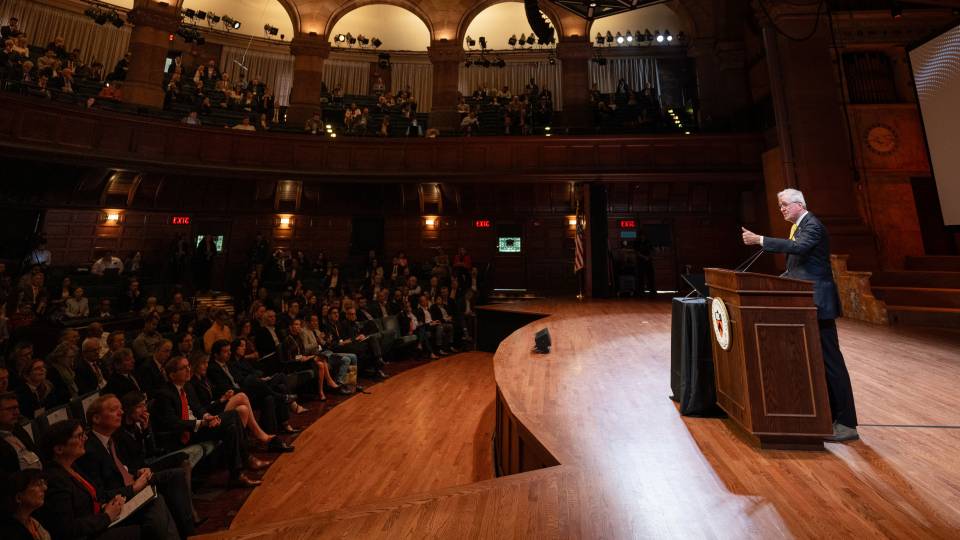Princeton’s AI4ALL summer program aims to bring young people from underrepresented groups into the growing field of artificial intelligence (AI). During a three-week residential camp, rising 11th-graders explore AI applications such as smart speakers and home appliances — including the gadgets’ security vulnerabilities.
For three weeks this summer, high school students packed the conference rooms of Princeton’s Computer Science building, honing programming skills while taking on challenges in artificial intelligence — from sharpening computer vision for self-driving cars to identifying fake or misleading online news.
Princeton’s inaugural AI4ALL summer program brought 32 rising 11th-graders to campus for an immersive residential camp, July 23 to Aug. 11. The program aims to bring young people from underrepresented groups into the growing field of artificial intelligence (AI), a branch of computer science that involves creating autonomous systems capable of processing human language, recognizing images or analyzing complex data sets.

Welcoming participants during the program’s first week, Princeton University President Christopher L. Eisgruber emphasizes the importance of broadening talent pools in all fields.
The students learned the fundamentals of AI technology through lessons and hands-on exercises, and heard from Princeton professors working at the forefront of AI research in computer vision, cybersecurity and bioinformatics. They also delved into their own group research projects, with guidance from Princeton graduate students and recent graduates.
The projects explored a variety of AI applications: smart speakers and home appliances — including the gadgets’ security vulnerabilities; algorithms that guide self-driving cars; processing human language to flag false news; and making meaning of massive data sets from the Fragile Families and Child Wellbeing Study, which has tracked outcomes for nearly 5,000 children from birth to age 15.
“We really try to emphasize AI for social good,” said program co-director Olga Russakovsky, an assistant professor of computer science. “We talk about some of the ethical issues, we talk about some of the fears around it. … But we try to focus on AI in health care, AI in education, AI for accessibility, AI for disaster relief, AI for sustainability … AI for solving all of these various challenges and problems that we face in the world.”
Russakovsky established the AI4ALL foundation in 2017 along with her former Ph.D. adviser, Fei-Fei Li, a 1999 Princeton alumna and a professor of computer science at Stanford University. They sought to build on the success of the AI camp for girls they had piloted at Stanford in 2015.
This summer, AI4ALL expanded to six universities in North America, with each camp featuring a different focus. Princeton’s program has been developed as a joint effort of the AI4ALL foundation, the Department of Computer Science and the Center for Information Technology Policy (CITP). The program is additionally sponsored by the Siegel Family Endowment with contributions from the Center for Statistics and Machine Learning and the Office of Information Technology.
AI systems “are influenced by how we think about the world, where we think to go look for data … by the solutions that we think to explore,” said Russakovsky. “If our field is very homogeneous — if we have people who only come from certain backgrounds, who only come from certain perspectives … who’ve read certain particular books as kids and were shaped by certain particular cultures, that’s inevitably going to propagate into the AI models that we’re actually building.”
Welcoming participants during the program’s first week, Princeton University President Christopher L. Eisgruber emphasized the importance of broadening talent pools in all fields: “If I start looking around and seeing that people from a certain background are underrepresented in a field … my immediate reaction to that is, we’re missing some talent that could make a difference in this field,” he said. “I know there are talented people from all backgrounds and all groups who can make a difference in our society.”

AI4ALL participants listen to a guest lecture by Arvind Narayanan, an associate professor of computer science who studies information privacy and security.
To help diversify the next generation of AI researchers and developers, Russakovsky and co-director Edward Felten, director of CITP, recruited students from groups underrepresented in AI who performed well in high-level math and science courses at their schools. “But beyond that,” said Russakovsky, “we really look for students who are going to be leaders in any field that they choose to pursue.”
In addition to introducing participants to the technical aspects of AI, the Princeton AI4ALL program emphasized the public policy and ethical implications of AI technology. The camp included a two-day field trip to Washington, D.C., where students visited federal agencies and met with officials working to develop policies for artificial intelligence. Russakovsky said the trip was a bonding experience for the students and exposed them to diverse viewpoints.
Participants said the program transformed their views of the potential of AI and of computer science more broadly. Maya Kahló De Los Santos, who attends Bergen County Academies in Hackensack, New Jersey, said AI4ALL introduced her to possibilities far beyond the introductory coding she learned at school. “Coming to this camp shows you how you can apply it to the real world, and apply it to AI, and make a difference with it,” she said.
As part of the summer program, De Los Santos was one of eight students involved in a project that applied natural language processing techniques to compare the content of a news article to its headline — with the goal of developing an automated clickbait detector. Identifying clickbait is sometimes difficult for non-native English speakers, making this an AI application with important societal benefits, she said.

Renato Pagliara Vasquez (center), a graduate student in mechanical and aerospace engineering, guides AI4ALL students in a project to analyze data from the Fragile Families and Child Wellbeing Study, which has tracked outcomes for nearly 5,000 children from birth to age 15.
Cathy Chen, who graduated from Princeton this year with a degree in computer science, served as one of the instructors on the project. The students “see all these people who are creating these really fancy algorithms,” and the AI4ALL program makes the technology more accessible, said Chen. “Maybe they won’t remember all the specific Python syntax, or all the steps of the algorithm, but I hope they come away with an appreciation for what they might be able to do in the future.”
Kasar Profit, a rising junior at St. Raymond’s High School for Boys in the Bronx, said he was excited to be learning the Python programming language, as he plans to study astrophysics in college, and computer science is critical for analyzing data in any field of science. In his AI4ALL group project, Profit said he enjoyed the challenge of working with data from the Fragile Families Study to try to predict how conditions in early life impact a child later in life.
In that project, students made choices from among scores of categories of survey data, such as how children get along with their parents, how engaged they feel at school, whether they are bullied, the age and race of their parents, and many other questions. They applied AI techniques to their choices to predict a child's grade point average at age 15. In doing so, the students saw firsthand how their decisions about what data to use affected the outcomes of their algorithms.
Renato Pagliara Vasquez, an instructor on the project and a graduate student in mechanical and aerospace engineering, noted that AI4ALL students brought a fresh perspective to the Fragile Families Study, which is led by researchers from Princeton and Columbia University. “You have this diverse group of kids who come up with interesting new ideas, and it’s because they have completely different experiences” and may relate to the children in the study, said Pagliara Vasquez. “I think that’s the beauty of AI4ALL. It’s trying to bring diverse opinions and experiences into the systems that will shape the future of the technology.”
The students presented their projects at the program’s closing dinner on Aug. 10, and heard a keynote talk from Associate Professor of African American Studies Ruha Benjamin, who studies issues of race, ethnicity and gender in science and technology.
Following the program, the students join the AI4ALL alumni community, which offers continuing support and opportunities for further learning and outreach. Ultimately, Russakovsky hopes AI4ALL participants are inspired and empowered to pursue “a career within AI, or AI plus any other fields that they may be interested in … AI plus medicine, for example, AI plus education, AI plus policy, AI plus art — AI plus wherever their passion lies.”
Princeton faculty members who guest lectured for the program shared their own career paths with the students, which De Los Santos said she especially appreciated. “It’s really amazing to hear all of their stories, and just hear the way that their careers have gone through so many changes, but they still made it to a profession that they love and that they worked hard to get into,” she said. “You can see, ‘Whoa, I can do this one day — I can be a person in the STEM field who makes a difference.’”

On a two-day field trip to Washington, D.C., AI4ALL participants visited federal agencies and met with officials working to develop policies for artificial intelligence. Here, the group poses in front of the Eisenhower Executive Office Building.







